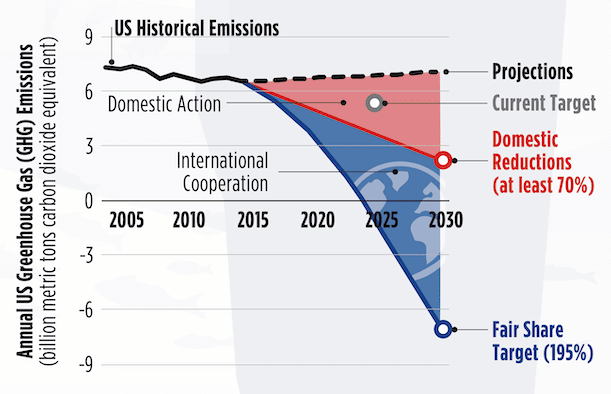Why this article in the @washingtonpost massively understates the level of needed U.S. climate action, and places the burden squarely on the poorest countries in the world while leaving rich countries largely off the hook: a thread. https://www.washingtonpost.com/opinions/2020/11/17/heres-how-biden-could-get-us-lead-climate-change-again/ (1/9)
The report that the article is based on says the U.S. needs to reduce emissions by 54-69% by 2030 to be “1.5°C compatible.” This is based on assumptions about emissions cuts that need to happen elsewhere in the world, to reach the global goal of limiting warming to 1.5°C. (2/9)
But those assumptions are largely based on "global cost-optimization," i.e. more emissions cuts taking place where it's cheaper to do so. That shifts mitigation responsibility to poorer countries, even though the wealthier countries have been the major historical emitters. (3/9)
A better analysis would explicitly factor in equity and fairness. @USCAN recently ran a process to determine what the U.S. "fair share" of emissions reductions should be, if we properly factor in different countries' historical responsibilities and national wealth. (4/9)
We found that the U.S. fair share is equivalent to 195% reductions by 2030, far from the 54-69% that a cost-optimization, non-equity-based approach shows. We must cut our emissions by as close to 100% as possible by 2030, AND provide $$$ for poorer countries to do the same. (5/9)
Only by doing BOTH of those things (deep domestic emissions cuts + intl support for poorer countries) can the U.S. do its fair share. And only if the U.S. does its fair share will the world have any hope of meeting the 1.5C goal, on which literally millions of lives depend. (6/9)
The full @USCAN fair shares analysis is forthcoming, but here is a preview of the takeaway graph. It assumes 70% domestic emissions reductions by 2030 - actually, we can do even better! - with the rest of our fair share met through international finance. (7/9)
A report that only tells you the U.S. should cut emissions 54-69% by 2030 misses a massively important piece. Domestic cuts aren't enough by themselves. The U.S. fair share is so big that w/o hugely ramped up climate finance & tech transfer, we won't be pulling our weight. (8/9)
Underestimating the U.S. fair share shifts the burden of the climate crisis onto poorer countries that did little to cause the crisis. It's fundamentally unjust. See http://civilsocietyreview.org/ for our global fair shares analysis; stay tuned for more U.S.-specific bits. (9/9)

 Read on Twitter
Read on Twitter


